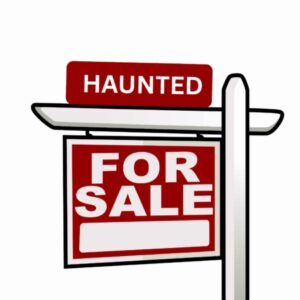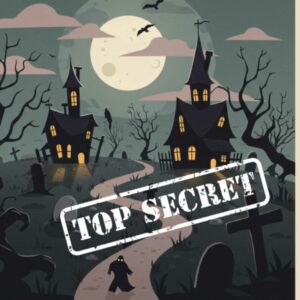 Though it sounds wild, a state supreme court officially ruled in 1989 that a house was haunted. The judge’s exact words were “As a matter of law, the house is haunted.” This is still the final ruling on this case, and it opened up decades of legally mandated ghost disclosure. So, how did we get here?
Though it sounds wild, a state supreme court officially ruled in 1989 that a house was haunted. The judge’s exact words were “As a matter of law, the house is haunted.” This is still the final ruling on this case, and it opened up decades of legally mandated ghost disclosure. So, how did we get here?
Ghosts play a much larger role in real estate sales than you might imagine. A Zillow study recently found that 12% of homes are haunted. This was a double-blind, placebo-controlled study conducted by Harvard research scientists… in no way whatsoever. This was actually the result of a survey finding that 12% of homebuyers think their home is haunted… whatever that means!
Though I’m making fun of this survey, I’m actually open to the idea that there are haunted houses. Quite honestly, if I heard that a house I liked were haunted, I probably wouldn’t buy it. It’s not that I’ve seen hard scientific proof of the paranormal; I just believe that there is an incredible amount that we don’t know about the universe. Regardless of whether ghosts are real, there is one state that requires disclosure of paranormal activity in real estate sales, and that is… New York, of all places!
New York’s precedent-setting ghost disclosure case Stambovsky v. Ackley went all the way to the New York Supreme Court, which famously wrote the line “as a matter of law, the house is haunted.” This makes it seem like there were spiritual subpoenas or a court-ordered seance. However, in reading about this case, it becomes clear that the court determined as a matter of law that the house was haunted; not as a matter of fact. It’s helpful here to recall certain legal constructs that are matters of law but not of fact; for example the legal fiction that a corporation is a person. This is true in law, as a corporation can hold title to real estate as an individual, but it is not a matter of fact that a corporation is a person. 
The Stambovsky v. Ackley house became legally haunted because the home’s seller, Ms. Ackley, widely publicized that the house was haunted in both local and national publications, including in Reader’s Digest. Her description of the home’s supernatural character in various news media made the home into a local legend. The judge determined that Ms. Ackley could not reasonably deny that the house was haunted, since this would contradict her own widespread statements about it. Note that the judge did not weigh in on whether the house was actually haunted, but determined that Ms. Ackley could not legally deny that it was haunted in her experience. Additionally, Ms. Ackley’s efforts to communicate to the world that the house was haunted put the house in a reputationally stigmatized condition.
The buyer, Mr. Stambovsky, sued to get out of the purchase contract and get his $32,500 down payment back because he found out about the property’s grave spiritual problems only after entering into the contract. The court ruled that Ms. Ackley should have proactively disclosed that she knew the house to be haunted to any potential buyer, in addition to disclosing the house’s local reputation.
This brings up another fascinating aspect to this case, which is that New York is a caveat emptor state, meaning that it’s a “buyer beware” state. Buyer beware doctrine means that buyers are responsible for doing their own due diligence for the most part; if the buyer doesn’t have an inspection performed, it’s not usually the seller’s fault for not proactively disclosing problems that an inspection would have uncovered. This makes it especially surprising that Ms. Ackley was supposed to proactively disclose the home’s ghostly condition.
At first glance, it seems odd that state law requires the seller to proactively disclose almost nothing, except the existence of ghosts… right? If the burden is on the buyer to perform their own due diligence and discover information the seller is not obligated to volunteer, then why would this not apply to the spirit realm? 
Though this seems strange, it actually makes a degree of sense. The reason that Ms. Ackley was held to a higher standard of disclosure is precisely because a home inspection could not have uncovered paranormal activity or a reputation of such activity. According to Cornell Law School’s description of caveat emptor doctrine, a buyer may only seek damages if they “acted prudently and exercised due care to assess the fitness and value of the purchased property.” This means that a buyer who did not conduct a home inspection, for example, may not seek damages if a home inspection would likely have uncovered the home’s hidden defects. However, once a buyer does all the reasonable due diligence they could possibly perform, then that buyer can hold the seller responsible for certain issues. Put another way, the seller can be held responsible for omitting facts that could not have been uncovered by reasonable inspections, and there is no legally recognized inspection for hauntings. Thus, the court determined that caveat emptor doctrine did not apply to this case.
Since the buyer, Mr. Stambovsky, was not from the area, he would not have known the home’s status as a local legend. Though Ms. Ackley had discussed her home’s hauntings in a national publication, the home was not nationally famous. Even through an investigation of title records, Stambovsky could not reasonably have uncovered a haunting, or a reputation of one. An out-of-towner who did all their due diligence would not reasonably deduce that Ms. Ackley had been running a publicity campaign about the house being possessed. Thus, buyer beware doctrine did not apply, and Ms. Ackley was required to proactively disclose that she was locally famous for believing her home to be haunted, according to the New York Supreme Court.
I’d like to note that this case was in 1989, well before the internet became widespread. These days, I do an internet search before even taking a breath of air, so I’m curious to know how this case would have played out in the present day. Is conducting an internet search on a property part of reasonable due diligence according to caveat emptor doctrine?
Among other things, this case is a reminder that it’s often difficult to know what’s going to become illegal in advance, especially if it’s a complicated situation like this haunted home sale. I can understand why Ms. Ackley might have thought she didn’t need to disclose anything because New York is widely known to be a buyer beware state. Who could know that this buyer beware doctrine would exclude paranormal activity? That said, the fact that you’ve made your home infamous as a stigmatized property seems instinctively like something you should disclose to buyers.
There really isn’t a replacement for using your ethical instincts about honesty and fair dealing. If you’ve created a widespread publicity campaign about your house being haunted, it seems ethical that you should disclose this to a potential buyer. If you’re unsure, just remember that even if something isn’t explicitly prohibited by law, it could still be found illegal later on. If you’re not careful, you could easily become the focus of a precedent-setting case. New York case law didn’t used to explicitly prohibit running a publicity campaign about your own house being haunted and then trying to hide this infamous haunting from potential buyers… but now it does!
https://abovethelaw.com/2018/10/as-a-matter-of-law-the-house-is-haunted-a-halloween-reminder-of-a-shockingly-recent-new-york-appellate-case/
https://zillow.mediaroom.com/2023-10-24-Nearly-70-of-prospective-buyers-would-buy-a-haunted-house-if-it-checked-all-their-boxes
https://www.reddit.com/r/zillowgonewild/comments/1gws078/comment/lycv7x1/
https://www.nytimes.com/2024/10/21/realestate/selling-haunted-houses.html
https://www.weselllouisville.com/blog/should-you-have-to-tell-buyers-your-house-is-haunted/
https://www.atlanticsir.com/blog/curious-real-estate-facts-that-will-surprise-you/
https://info.cooley.edu/blog/think-your-house-is-haunted-dont-sell-until-you-get-some-legal-advice
https://www.al.com/life/2024/10/buying-or-selling-a-haunted-house-heres-what-the-law-says-you-need-to-do.html
https://thisiscriminal.com/episode-145-how-to-sell-a-haunted-house/
(866) 519-9597



